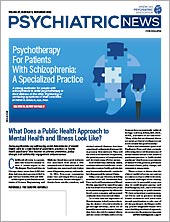Anorexia nervosa is a complex disorder, with the second highest mortality rate of any psychiatric illness. Yet even when treatment is inaccessible or when multiple prior treatments have failed, there are ways to support patients. Harm reduction and palliative care focus on improving quality of life and foster hope of eventual motivation to reverse malnutrition and recovery.
A recent article by Jennifer Gaudiani, M.D., and colleagues published in the Journal of Eating Disorders proposed criteria for the term “terminal anorexia.” The authors argued that such a term would make individuals with anorexia nervosa eligible for medical assistance in dying (MAID). We add our voices to the growing number of eating disorder professionals who have expressed their concerns around the use of this term. “Terminal” is not an appropriate descriptor for a psychiatric condition for which there is a known and proven cure. Unlike medical concerns such as end-stage cancer or a neurodegenerative disorder, almost all the medical complications of anorexia (with the exception of osteoporosis) are reversible. We must protect vulnerable patients (and their caregivers) who may be easily persuaded that there are no treatment options available for them.
Gaudiani and colleagues defined the criteria for terminal anorexia as having a diagnosis of anorexia nervosa; being age 30 or above; prior persistent engagement in high-quality, multidisciplinary eating disorder care; and consistent, clear expression by the individual (who possesses decision-making capacity) indicating an understanding that further treatment is futile, a choice to stop prolonging life, and an acceptance that death will be the natural outcome of the individual’s anorexia nervosa.
The article included a case series of three patients. One of the patients entered palliative and hospice care and died thereafter; MAID was not considered for this patient. Gaudiani completed MAID forms for a second patient (whose palliative-care physician prescribed the medications that resulted in her death); and the third patient, listed posthumously as a co-author, was also prescribed MAID medications by Gaudiani.
Each of the proposed characteristics for terminal anorexia is problematic. First, it is highly concerning that Gaudiani and colleagues would label an individual as terminal at the age of 30. In response to Gaudiani’s article, Angela Guarda, M.D., and colleagues noted that recovery from anorexia nervosa can occur well beyond age 30. Although many patients who develop anorexia nervosa do so at ages younger than 30, there are also patients who present later in life or take decades to engage in treatment. One study indicated a mean age of 35.5 years at index admission in a sample of over 5,800, and another indicated that at least two-thirds of individuals with anorexia nervosa had recovered at 22 years of follow up—when the mean age of participants was 47 years old. Thus, setting an arbitrary age criterion may rob patients of the opportunity for treatment and eventual recovery.
While Gaudiani and colleagues’ assertion that “prior persistent engagement in high-quality, multidisciplinary eating disorder care” as a defining criterion for terminal anorexia nervosa may sound reasonable, when applied to the cases in the article, this statement is a non sequitur. The two patients in Gaudiani’s report were offered MAID without ever receiving adequate trials of specialty disorder treatment. One patient underwent two brief stays in intensive treatment before leaving against medical advice, while another was hospitalized for medical stabilization but thereafter reneged on enrolling in a residential program. These fleeting attempts at treatment can hardly be considered “prior persistent engagement in high-quality, multidisciplinary eating disorder care.”
As to Gaudiani’s fourth criterion requiring a patient to possess “decision-making capacity,” assessment of capacity to refuse care (let alone agree to MAID) is especially challenging in patients with anorexia nervosa. Most patients appear rational in all ways but one: their ability to fully appreciate how the risks and benefits of treatment decisions apply to their own condition. Standardized tests frequently fail to identify lack of capacity in patients with anorexia nervosa, and most general psychiatrists and palliative care specialists have little experience in assessing capacity of these patients. The overly simplistic stance taken by Gaudiani and colleagues regarding capacity also fails to recognize the effect of malnutrition on the brain. Furthermore, the eating disorder (as a result of the aforementioned malnutrition) can usurp an individual’s autonomy, rendering that individual more susceptible to the suggestion of hopelessness.
Finally, persuasion and encouragement of a vulnerable individual is coercive. A patient’s capacity to consent to MAID must be assessed along with coercion. Guarda and colleagues noted that in at least one case mentioned in Gaudiani’s report, MAID was suggested by the treating physician. To another patient, the idea of treatment futility was reinforced despite the patient’s not completing a full course of intensive treatment. The treating physician’s implicit or explicit agreement with a vulnerable and symptomatic patient’s assertion that “further treatment is futile” is ill advised, highly problematic, and likely to be further demoralizing to the patient.
Many patients with anorexia nervosa have long spans of treatment resistance and recalcitrance, yet many will ultimately improve. It is troubling to think that some of these patients may have engaged in physician-assisted suicide within the framework proposed by Gaudiani and colleagues. ■
